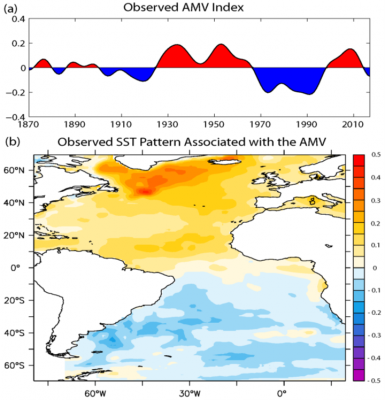A Review of the Role of the Atlantic Meridional Overturning Circulation in Atlantic Multidecadal Variability and Associated Climate Impacts
By synthesizing recent studies employing a wide range of approaches (modern observations, paleo reconstructions, and climate model simulations), this study provides a comprehensive review of the linkage between multidecadal Atlantic Meridional Overturning Circulation (AMOC) variability and Atlantic Multidecadal Variability (AMV) and associated climate impacts.
This synthesis points to a leading role of the AMOC in a range of AMV‐related climate phenomena having enormous societal and economic implications, for example, Intertropical Convergence Zone shifts; Sahel and Indian monsoons; Atlantic hurricanes; El Niño–Southern Oscillation; Pacific Decadal Variability; North Atlantic Oscillation; climate over Europe, North America, and Asia; Arctic sea ice and surface air temperature; and hemispheric‐scale surface temperature.
There is strong observational and modeling evidence that multidecadal AMOC variability is a crucial driver of the observed AMV and associated climate impacts and an important source of enhanced decadal predictability and prediction skill. The AMOC‐AMV linkage is consistent with observed key elements of AMV. Paleoclimate evidence indicates that a similar linkage between multidecadal AMOC variability and AMV and many associated climate impacts may also have existed in the preindustrial era, that AMV has enhanced multidecadal power significantly above a red noise background, and that AMV is not primarily driven by external forcing. The role of the AMOC in AMV and associated climate impacts has been underestimated in most state‐of‐the‐art climate models, posing significant challenges but also great opportunities for substantial future improvements in understanding and predicting AMV and associated climate impacts.

